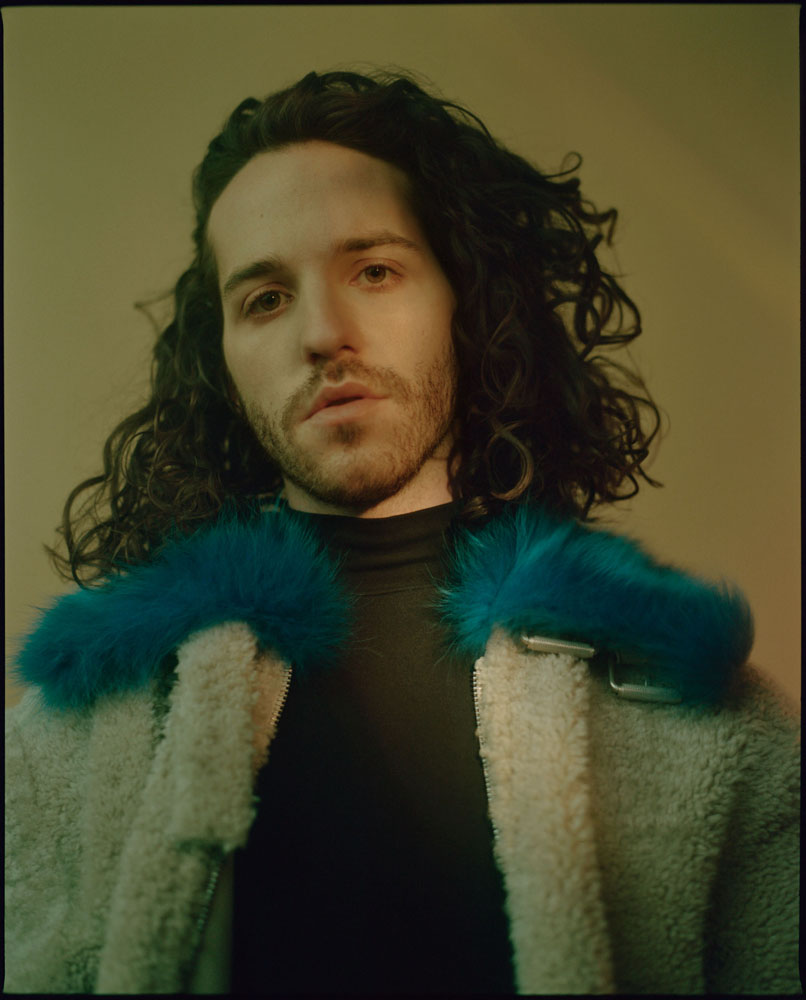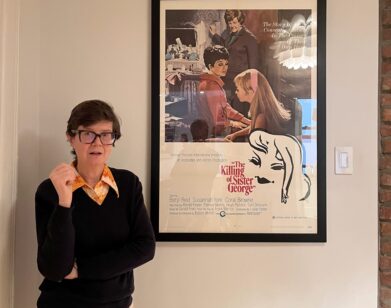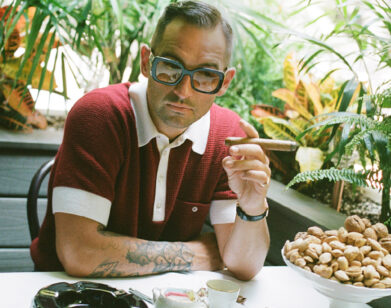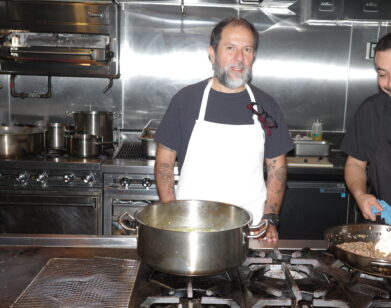Eli Russell Linnetz
“I see something verified here which is essential in real, deep storytelling,” Werner Herzog said in an analysis of the music video for Kanye West’s “Famous,” a video tableau featuring lifelike dolls of the rapper, Donald Trump, Rihanna, Taylor Swift, and other celebrities naked in bed together. “This video gives you space for creating your separate, parallel story.”
The video, directed by then-24-year-old Eli Russell Linnetz, was, like much of what Kanye does, a sensation, and it was also a superb celebration of all that makes Kanye such a provocative figure in pop culture: the outré-ness of the nudity, the invasiveness of borrowing the likenesses of other public figures, the puckish, ironizing of fame … But then came Kanye’s Flashdance-inspired video for “Fade,” starring Teyana Taylor and featuring her real-life husband, NBA star Iman Shumpert, again under the direction of Linnetz, and people beyond just Mr. Herzog began to notice the touch of a really interesting new artist working in chorus with the singer.
Only, what makes Linnetz so beguiling as an artist and collaborator is also what makes him so difficult to qualify. Beyond the videos, Linnetz’s influence can be seen and felt on various Kanye joints: from the Saint Pablo tour to the Yeezy clothing line, and, oh, remember those intimate family portraits with which Kim Kardashian West returned to social media after the fracas around the theft of her jewels in Paris? Linnetz took those as well.
And if it is not so terribly regimented within the house of KimYe, with proper titles and rigid roles, Linnetz is not the one to go out of his way to clear up the mist and mystique around their process. When fielding questions about his life or work, the now-25-year-old native of Venice Beach, who studied screenwriting at USC and assisted David Mamet during the run of his play Race, Linnetz will answer, as often as not, with a vibey non sequitur wrapped in an enigma and powdered with irony. But lest you take that as typical millennial posturing—all apathy and winking shrugs—Linnetz is very clear that he cares about what he does, who it affects, and what it’s all for. As he tells his friend and fellow Kanye Corp. staffer, the artist Elon Rutberg, he’s only after real talk and really good work.
ELON RUTBERG: I’m not particularly sure what we’re supposed to say about you. You’re a bit of a mystery.
ELI RUSSELL LINNETZ: I’m fine with that.
RUTBERG: No, I know. But the world knows very little about you. And I’m a big believer in never forcing things.
LINNETZ: Me, too.
RUTBERG: That’s why we’re friends, I think.
LINNETZ: Yeah. I don’t want this to be wasteful. We actually spent a good amount of time trying to find someone else to interview me. I thought people would like our normal conversations. They’re honestly the best part of my day. The most influential at least.
RUTBERG: Me, too. You’re the only person that I have never felt the need to apologize to for anything I’m saying.
LINNETZ: We just say it.
RUTBERG: Friendship is a really interesting place to start from. People don’t understand the nature of how we got started.
LINNETZ: We were just working on Broadway together. I was assisting David [Mamet] and you were working for Jeffrey [Richards] the producer. And that came at a moment where there were a lot of unclear paths, and suddenly it was like there was never even …
RUTBERG: You are one of the few people in my life where there was never a sense of questioning.
LINNETZ: Broadway is a beautiful entity, but it’s very antiquated.
RUTBERG: I went to Broadway because I wanted to help guide the future of a humanistic and innovative popular art form that I loved very much. That’s also the reason I left.
LINNETZ: Sometimes you have to leave and come back if you actually want to make an impact.
RUTBERG: It’s sad, though. I thought everything was going to be Sondheim.
LINNETZ: No. But Sondheim is everything.
RUTBERG: Shout out.
LINNETZ: Sometimes people just need to be themselves and wait for the world to find them.
RUTBERG: I believe in patience a good deal. But people also need to know how to fight for what they believe in. I got kicked out of two Broadway theaters for opening my mouth. The shows had problems that weren’t being addressed, and the system worked against addressing problems. I cared more about the shows succeeding than about pissing people off. So I opened my mouth.
LINNETZ: And they freaked out.
RUTBERG: And I got reassigned to the Tracy Letts play about donuts [Superior Donuts] for two weeks while the window we had to fix the show went away.
LINNETZ: And then the show opened, and the reviews called out every single thing you were trying to fix.
RUTBERG: The director pulled me aside at the after-after party and apologized, said I was right about everything, that people in the future will continue to try and shut me up, and that I shouldn’t ever let them. It meant a lot.
LINNETZ: People don’t know when they’re destructive.
RUTBERG: I’m sitting here more afraid of people’s small-mindedness, powerlessness, and helplessness.
LINNETZ: Feelings get in the way. Outdated notions.
RUTBERG: A lot of people like the helplessness.
LINNETZ: We have to capture what it’s like now. No old ways of thinking. We have the internet. We have to be in the business of finding beauty where it lies.
RUTBERG: Sending images back and forth.
LINNETZ: Like amateur porn. People creating to satisfy their own desires. Some random person in Ukraine has a desire … People are watching now. There’s a lot of good stuff. Your natural decisions are the decisions that are going to be good.
RUTBERG: That idea of non-momentousness …
LINNETZ: We know how to make beautiful images. The ownership doesn’t matter. You are someone; that’s enough. Everybody’s feelings are ultimately the same. The desire to be special, to be wanted, to be seen. That’s the same, too.
RUTBERG: If a map of everyone’s world is truly 150 people or less, then it’s just your friends and family. Just talk to your friends and family.
LINNETZ: I remember early on with “Fade,” I called you and was like, “I can’t figure out why this is not interesting to me.” And you said, “Family.”
RUTBERG: Yeah—that merely having Teyana and Iman and their daughter on camera, being themselves and looking amazing, was in and of itself an act of quiet revolution, a complete reframing of what an aspirational American family can and should look like.
LINNETZ: And Teyana has always been there. She’s always been doing her thing and moving about, and has always been like, “I am not going to compromise. These are the things that make me happy as an artist. I always need to be dancing. I know what music moves me.” She loves herself and her sound and pays no mind to what anybody else is trying to push on her.
RUTBERG: There is way more honor in the exchange.
LINNETZ: Teyana placed the same trust in me. She didn’t “present,” she just let herself go. It’s so giving.
RUTBERG: You have to trust instinct.
LINNETZ: I don’t like telling really talented people who are amazing what they should do. I’m just going to let them be. It has to be complete freedom—creativity has to be complete freedom.
RUTBERG: One thing that I love about Kanye is he gives you the freedom to go down that rabbit hole.
LINNETZ: I spent two fucking weeks in Second Life, creating album art just by living through this other character—something that never even made it to the album cover, but that’s part of the story, the places we explored. The hundreds of thousands of references we had to pull. It’s hard work, but I always feel supported.
RUTBERG: That tends to be the nature of the process. You’re part of a family.
LINNETZ: You have to surround yourself with friends and loved ones because they’re the only ones that will fight for you.
RUTBERG: In battle?
LINNETZ: It’s always a battle to get the extra feeling in there, to push it further, to lose yourself. We can’t be living constantly with some numb relationship.
RUTBERG: Things have to be known.
LINNETZ: If I don’t make the best of this and I don’t break all the things that are making me feel bad, I’m going to be nothing.
RUTBERG: Because at the end of the day—
LINNETZ: We can’t dispose of the everydayness of people’s struggles. We have to build a world that is ultimately supposed to be, very simply, everybody doing what they are happiest doing.
RUTBERG: I’ve been going around to people recently and being like, “Do you have more than a thousand followers? You have responsibility.”
LINNETZ: People are experiencing the terror of being ejected from the space station and seeing the big picture for the first time.
RUTBERG: We don’t have a way to quantify this kind of stuff. It’s the end of this whole kind of weird insulation.
LINNETZ: It’s unsettling for people to feel so unsettled. But doing things in isolation is just not a luxury that anybody can afford anymore.
RUTBERG: This is not the dystopia that we paid for. It used to be you had a key and a license and you knew how to drive, and that was it. It’s someone else’s job to understand what happens underneath the hood—that’s supposed to be our relationship with this. Almost everything is outside ourselves, and no one is really trying to manage or really understand the nature of the things that live outside our perception.
LINNETZ: This idea of artistry, this idea of creativity … Ultimately, it has to be just real talk. We have to give a common way for people to access the world around them—even just words and terminology that we know are representative of the future.
RUTBERG: If we don’t have some kind of counterbalance to all of this stuff, we’re just paying credence to older systems that are inherently unfair.
LINNETZ: I need to make clear to the people at home that you actually say shit like that all the time on the spot.
RUTBERG: Yes, very much confirmed.
LINNETZ: At the end of the day, the internet is a fair space. A medium of infinite resource. And something we’ve never had before, ever. But people aren’t connecting the dots, and that’s what scares me.
RUTBERG: The big problem right now is that there could be a future that is nothing more than a permanent 1985-backslid into our learned helplessness—the years of just feeling crowded and small. People scared all the time. And that fear is more powerful than the possibilities and facts before us.
LINNETZ: Getting over the hill of acquiescence, just kind of dealing with shit, is the only way of getting to the good stuff. It’s not even complicated. We just wish there was a button to fix it. The only real talk is like, why haven’t we developed that button?
ELON RUTBERG IS A MULTIDISCIPLINARY ARTIST AND CREATIVE DIRECTOR.







